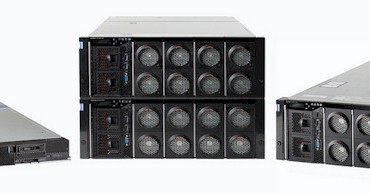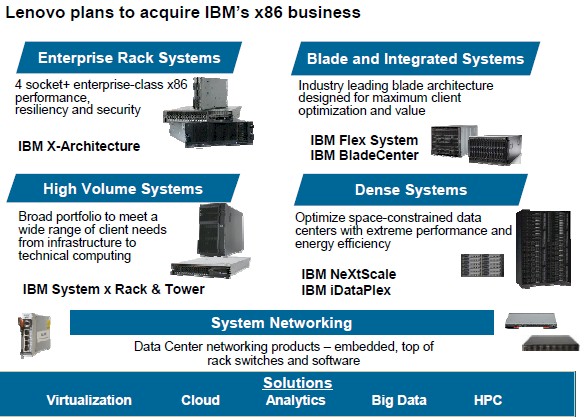Lenovo Enters Datacenters With $2.3 Billion IBM X86 Server Deal

The many thousands of large enterprise customers, government agencies, and supercomputer labs that depend on IBM System x, BladeCenter, iDataPlex, and PureSystems servers will soon have a new partner: Lenovo Group. The Chinese company is paying $2.3 billion to acquire IBM's X86 server business.
The two companies have also hammered out reseller agreements that will tightly bind them, with IBM peddling Lenovo X86 servers and Lenovo pushing IBM storage and various system and management software.
In April last year, rumors were going around, which neither IBM nor Lenovo confirmed, that IBM wanted somewhere between $5 billion and $6 billion for its System x Division and that Lenovo was a possible buyer. As EnterpriseTech previously reported, rumors started up this week that a deal was in the works again, and the word on the street was that Dell and Fujitsu were both taking a look in addition to Lenovo.
By acquiring IBM's System x business, Lenovo becomes the number three X86 server shipper in the world, but it has a long way to go to catch Dell and even further to catch Hewlett-Packard. The System x business generated somewhere around $5.6 billion in sales in 2012 and could do an estimated $4.5 billion in 2013. On a conference call with journalists going over the deal, Peter Hortensius, who is president of the Think Business Group at Lenovo that is focused on enterprise accounts, said that the deal was "the logical next step" for Lenovo, and that by buying IBM's X86 server business it would accelerate its plans in the datacenter by about five years.
"We know from working with IBM over the years that we can make this seamless and easy for our customers. It allows the IBM team to exploit our strengths as Lenovo," Hortensius said. "And in one move it lifts us from being number six to being number three with 14 percent market share." That is almost a factor of ten market share growth for Lenovo – if the company can hold onto that share, of course. "For Lenovo, these products provide a significant improvement in our overall profit margin," Hortensius added. "There are many good financial motivations to do this deal."
IBM has never been a low cost manufacturer during the electronics age, although it certainly did have a flair with electromechanical devices in the first half of its life. Selling off the PC business to Lenovo in late 2004 also gave IBM less leverage with chip makers Intel and AMD, which probably also cut into its X86 server margins. Lenovo, as the world's dominant PC shipper, have plenty of leverage with Intel.
Lenovo has a large presence in the United States in the Research Triangle Park area of North Carolina by virtue of its acquisition of Big Blue's PC business nine years ago. Lenovo set up a server design center in Mooresville back in the fall of 2012, which designs some of its ThinkServer X86 machines as well as custom gear that Lenovo manufacturers on behalf of EMC. By taking over the IBM X86 server business, Lenovo will roughly double its presence in the state.
Decades ago, when the PC first took off inside the enterprise, IBM was the dominant supplier of desktop and then laptop machines for corporations and governments, but eventually Dell and Compaq encroached on its PC turf and leveraged their manufacturing prowess and supply chains to fuel a price war that eventually drove Big Blue out of PCs. Lenovo bought that PC business in December 2004 for $1.25 billion, and at the time this business brought in $11 billion and was barely profitable. It had lost billions of dollars in the PC market in the prior years. While IBM does not divulge its profits and losses for the System x Division, which peddles a variety of brands of machines based on Intel Xeons and, to a much lesser extent, AMD Opterons, but the consensus is that the System x business has been a drag on profits for some time. Quite possibly starting with the day IBM sold off the PC business and lost some pricing leverage with Intel and AMD.
Lenovo has worked hard to integrate IBM's PC business into its own, and has managed to outgrow the market and last year surpassed Hewlett-Packard and Dell as the largest shipper of PCs. In the most recent quarter ended last September, Lenovo grew its PC revenues by 15 percent but its pre-tax income by 30 percent, according to Gerry Smith, the senior vice president of Lenovo's America's region, who spoke on Bloomberg radio this morning. The idea, says Smith, is to use Lenovo's supply chain and lower-cost manufacturing to repeat this PC success with X86 servers.
Under the deal hammered out between Lenovo and IBM, Big Blue is selling Lenovo the intellectual property and customer base for its System x rack and tower servers, its BladeCenter blade servers and iDataPlex rack servers, its Flex System converged systems and related Xeon-based server nodes announced in April 2012, the NextScale hyperdense machines announced last September, and the System X6 high-end servers that were previewed last week. The BladeCenter blade servers are pretty much mothballed at this point, having been replaced by the Flex System machines; the latter are sold under the brand PureSystems as well. The iDataPlex machines, which got a certain amount of traction at enterprises and supercomputer centers, have been replaced by the NextScale systems. Lenovo will get the systems outlined above as well as their integrated networking, associated management software, and maintenance revenue streams.
Sources at IBM tell EnterpriseTech that Big Blue will retain the PureSystems brand, and the company said in a statement that it would keep making its own Power-based Flex System compute nodes and would similarly keep making its PureData appliances. (These are the FPGA-goosed parallel data warehouse machines that formerly were sold under the Netezza brand and that are based on the BladeCenter blade servers.) IBM is also retaining the PureApplication brand, which is what IBM calls a Flex System setup configured to run a specific workload. IBM will continue to make Power and z processors and System z mainframes and Power Systems servers that employ them, respectively.
The deal will also make Lenovo IBM's supplier for X86 servers and related switches and systems software.
Lenovo has agreed to license, OEM, and resell IBM's Storwize disk arrays and various tape storage technologies as well as its General Parallel File System, its SmartCloud Entry cloud controller, its System Director management tool, and the Platform Computing portfolio of cluster management and Java grid messaging products.
Significantly, it looks like Lenovo is also acquiring switching business that IBM built over recent years based on its acquisition of Blade Network Technologies back in September 2010. BNT was the foundation of the System Networking Division, and included switches for blade servers and converged systems as well as top-of-rack switches. This division has reseller agreements with Juniper Networks, Brocade Communications, and Cisco Systems and will continue to sell these products, and IBM tells EnterpriseTech that the OEM agreement between the two companies will allow IBM to resell the switches that used to bear its own brand that came from BNT.
Lenovo is giving IBM $2 billion in cash and $300 million worth of Lenovo stock to do the deal. The 7,500 employees of the System x Division will move over to Lenovo, and these include service and support personnel as well as those who work in development, sales and marketing, finance, legal, supply chain, operations, manufacturing, and IT. These employees are located in the Raleigh region and in Shanghai and Shenzhen in China and in Taipei in Taiwan. Adalio Sanchez, general manager of the System x Division at IBM, will be moving over to Lenovo, as will the executive management team related to the division, Sanchez said on the call.
The two companies will operate independently until the deal is completed later this year. And after that, the two companies will work together to sell combinations of Lenovo and IBM hardware and IBM software into current enterprise accounts. Whether enterprise customers will be happy with this arrangement remains to be seen.
This deal highlights a few competitive forces that are hard to reckon with. First, there is the irresistible pull of the manufacturing of IT gear towards China and away from the Western economies. It is simply difficult to make systems, storage, and networking gear in the United States, Canada, or Europe profitably. It also shows that with the Chinese economy slowing, IBM thinks it needs a strong partner inside China to sell products and services into China. IBM wants to sell software and services for its Smarter Planet initiatives and for analytics, where it can turn a tidy profit. With Lenovo as a systems partner for X86 gear, this will make it a lot easier.











